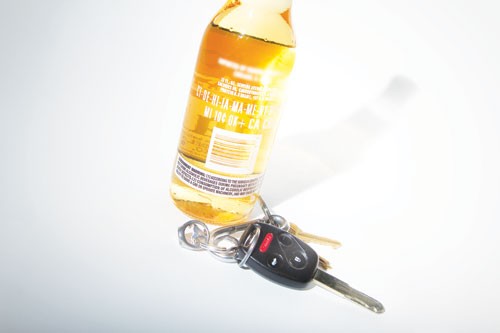
The Texas legislature is reviewing a bill that would reinstate deferred adjudication for DWI offenders. (Photo illustration by SPENCER EGGERS/The Daily Campus)
John Patton was 22 years old and was on top of the world.
A former athlete, Patton had gone to college on a football scholarship and was double majoring at Austin College with plans to attend law school the following year.
But on March 23, 2002, a small party with friends changed his life forever. After drinking for a few hours, Patton and a couple of others decided to move the party to his house, just five minutes away.
Patton decided to drive under the influence and he ran through a flashing red light and hit an oncoming vehicle.
He was knocked unconscious from the impact, but when he awoke, he saw the wreckage. After making sure he wasn’t injured too severely, officials took a sample of his blood to measure his blood alcohol content.
“And then the officer said, ‘Mr. Patton, I’m now going to read you your rights. You are being charged with two counts of intoxicated vehicular assault and one count of intoxicated manslaughter,” Patton said.
Patton has since served prison time for his offense and now speaks at MADD victim panels for Driving While Intoxicated (DWI) offenders and works as a counselor.
The 82nd Texas legislative session is currently reviewing a bill that proposes reinstating deferred adjudication for DWI offenders.
Deferred adjudication for DWIs was done away with in Texas in 1984, but almost three decades later it is making a comeback and causing a heated debate in the Capitol.
Deferred adjudication is a form of plea deal, where the defendant would plead “guilty” to the criminal charges in exchange for meeting the requirements set out by the court. As proposed, opting for deferred adjudication would result in supervision, treatment and one year of probation. If completed, the defendant would not receive a formal DWI conviction, but the courts would keep the notation in a person’s record as the basis for an enhanced penalty for a repeat offense.
The bill was also intended to help unclog the Texas court system. With large budget cuts in many areas of government, proponents of the bill say it would ease the backlog of DWI cases.
As of January 2011, there were 15,262 DWI cases pending in Dallas County alone. Statewide the number was in the hundreds of thousands.
“They need to have a stiffer penalty because we know a lot of repeat offenders are on the roads in Texas,” Executive Director of Mothers Against Drunk Driving (MADD) North Texas Mary Kardell said.
Representatives from MADD have spent time in Austin lobbying strongly for the bill.
However, despite MADD’s stamp of approval, DWI offender Patton does not agree with the proposed law.
He believes that deferred adjudication would serve as a free pass for drivers under the influence who get caught for the first time.
“The scary thing about that is my first drinking and driving offense killed someone,” Patton said.
Patton isn’t the only one who doesn’t think deferred adjudication is the answer. Texas DWI defense attorneys have been some of the loudest opponents of the bill. They believe that DWI offenders have no incentive to take the deferred adjudication because it does not completely eradicate the charge from their record.
“My clients are going to say ‘no thanks,'” Dallas DWI defense attorney John Gioffredi said. “You know, I’ll take my chances with a jury and try to get a ‘not guilty’ so I can have it erased.”
The proposed bill also includes statutes for sobriety checkpoints to be set up around the state and for ignition interlock systems to be placed in DWI offenders’ vehicles, even for first-time offenders.
The bill is currently pending in the State Senate.
“Texas is not playing around when it comes to drinking and driving,” Patton said. “I mean, this is killing people and changing peoples lives forever.”









